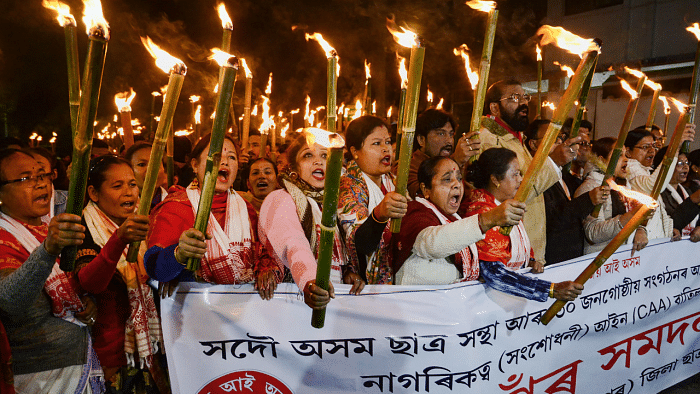
Several students’ organisations in the northeastern states staged a three-hour-long demonstration on Wednesday in all the state capitals of the region, reiterating their demand to scrap the Citizenship (Amendment) Act (CAA). They also demanded that the Inner Line Permit (ILP) system be introduced in the entire region.
The students’ bodies, which are part of the North East Students’ Organisation (NESO), resumed the protest against the CAA after two years. The anti-CAA agitation, which began in 2019, was mainly stopped due to the Covid-19 pandemic. The protests were staged in Aizawl, Kohima, Shillong, Agartala and Guwahati, the capitals of Mizoram, Nagaland, Meghalaya, Tripura and Assam, respectively.
“Our demand is to scrap the CAA, complete withdrawal of the Armed Forces (Special Powers) Act and bring Tripura, Meghalaya and Assam under the ILP,” Bishu Kumar Debbarma, president of Tripura Students’ Federation told reporters during the demonstration at Agartala. “The CAA will reduce the indigenous communities into a minority in the entire Northeast,” he said.
The ILP is in force in Arunachal Pradesh, Nagaland, Manipur and Mizoram. Under the ILP, people from outside need to take a travel permit to visit the four states. This, according to the organisations, would prevent settlement of “illegal migrants”.
In Assam, hundreds of members and leaders of All Assam Students’ Union (AASU) staged a demonstration in front of its office in Guwahati. Security forces were deployed outside the AASU office to prevent possible violence. The agitation in January 2020 had turned violent, and five protesters died in police firing.
The CAA, which was passed in December 2019, seeks to allow non-Muslim migrants from Bangladesh, Pakistan and Afghanistan, who settled in India till 2014 due to religious persecution, to apply for Indian citizenship. But organisations in the Northeast are opposed to it, saying this would allow a “large number” of post-1971 migrants to get Indian citizenship and reduce the indigenous communities into minorities.
The AASU wants detection of the “illegal migrants” with March 24,1971, as the cut-off and constitutional safeguards to the state’s indigenous population, as agreed in the historic Assam Accord signed in 1985.